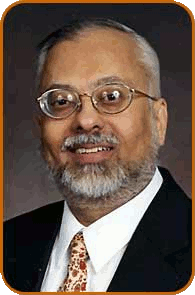- Grants for Research Work
-
- NSF Award for: "Nanoscopic Metal-Semiconductor Hybrid Elements and Arrays," ($180,000 over Sept. 2007-Aug. 2010 at WPI). Collaboration with S. Solin at Washington University in St. Louis;
- SUN Microsystems has given an Academic Excellence Grant of 3 high-end dual CPU workstations with large memory for initiating students in high-performance computing. ($28,515 September 28, 2006.)
- NSF Award for "Sensors: A New Class of Devices Based on Interfacial Effects in Metal-Semiconductor hybrid Structures" ($ 150,000 over three years from 2003-2006 at WPI) Collaboration with S. A. Solin at Washington University in St. Louis.
- AFOSR Award for "Wavefunction Engineering of Spintronic Devices in GaN/AlN and ZnO/MgO Quantum Structures doped with Transition Metal Ions." ($375,000 for three years 2003-2006.)
- NSF Award for "Investigation of Physical Mechanisms in Multi-band Tunneling in Layered Semiconductor Structures," 2000. ($117,977 over two years)
- DARPA-MURI grant for "Spintronics in Ferromagnetic InAs/ GaSb based Heterostructures", 2000. ($240,000 over four years).
- SUN Microsystems donated six (6) Ultra-Sparc 10 workstations through an Academic Equipment Grant for the modeling and simulation of quantum heterostructure devices using parallelized algorithms: 2000. ($52,000).
- SBIR Phase I grant at Quantum Semiconductor Algorithms, Inc., for computational algorithm development for "Wave function engineering of quantum nanostructures", 1999. (From BMDO: $65,000)
- SBIR Phase I grant at Quantum Semiconductor Algorithms, Inc., for computational algorithm development for simulating opto-electronic properties of quantum semiconductor structures. 1997. (From DARPA: $85,000)
- Naval Research Laboratory, Washington, D. C.: "Optical properties of quantum semiconductor structures'' and ``Lateral tunneling effects in semiconductor superlattices'', 1994-1995. ($30,000).
- NEC Research Institute: "The application of Boundary Integral Methods to the calculation of electromagnetic fields appearing in surface-enhanced Raman Scattering''; the work was performed at Quantum Semiconductor Algorithms, Inc; 1992-1995. ($15,000).
- Naval Research Laboratory, Washington, D. C.: "Optical properties of semiconductor superlattices'', 1991-1993. ($64,000).
- Digital Equipment Corporation: supported one student, for 2 years, for work towards his Ph.D. in the area of finite element and boundary element methods in electronic and electromangetic transport in devices (1990-1992). ($60,000).
- The Raytheon Company: for a computer workstation to incorporate symbolic analysis, using MATHEMATICA, in an undergraduate Mechanics course. ($8,000, with a matching grant from WPI). A second workstation was funded by MIT for collaborative research with the National Magnet Laboratory. 1990. ($7,500).
- Naval Research Laboratory, Washington, D. C.: ''Band structure of superlattices and quantum wells in external magnetic fields, and magneto-transport in such structures'', 1989-1991, ($53,000).
- The Naval Research Laboratory, Washington, D. C.: supported my work with MIT (WPI-MIT proposal) during 1987-1990, on the magneto-optics and nonlinear optics of superlattices. ($ 72,000).
- Throughout 1978-2005, I have done external consulting work, and involved students in the work, giving them research experience and publications.

LRRAM (at) wpi.edu
Center for Computational NanoScience (CCNS)
Wavefunction Engineering
